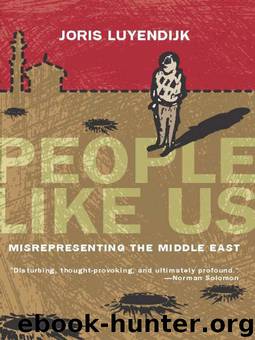People Like Us: Misrepresenting the Middle East by Joris Luyendijk

Author:Joris Luyendijk [Luyendijk, Joris]
Language: eng
Format: epub
Tags: General, History, Social Science, Language Arts & Disciplines, Middle East, Media Studies, Journalism
ISBN: 9781593762568
Publisher: Counterpoint Press
Published: 2009-11-15T04:01:32+00:00
Before I became a correspondent, I saw a journalist as a kind of a fly on the wall, an invisible microphone recording events, like the football commentators who sit somewhere in the stadium following the score, unseen by the players. But while football might be war, war is not football—not where Israel and Palestine are concerned. The media were continually manipulated and influenced by the parties concerned.
It was a new world, and fellow journalists explained to me what lay behind it. I’d thought that a media war was a war with a lot of media attention, but it went further than that. Compare the second intifadah with the border conflict being fought at the same time between Ethiopia and Eritrea, colleagues said. That was a classic war: Two parties fight each other with all the military might they have; the strongest wins; and the media report on that. But the conflict between Israel and Palestine is orchestrated differently. If they both threw everything they had into it, the case would be instantly settled. Israel rules supreme with its nuclear weapons, smart bombs, hyper-advanced tanks, fighter jets, helicopters, battle-ships, surveillance satellites, and submarines. Within twenty-four hours, it could drive off the Palestinians and, if it wanted to, all of its neighbors, too. This is something that some Israeli media and politicians regularly advocate. But it won’t happen, and you can’t separate that from the enormous media attention devoted to this area and the involvement of public opinion worldwide. And this public opinion is largely formed by what people see in the media.
Hello, everybody! As an Israeli PR manager said, “It’s not about what happens, but how it is presented on CNN.” In the Holy Land, newspaper pages and television screens weren’t just windows on the conflict—they were also a stage on which the conflict was being fought.
Download
This site does not store any files on its server. We only index and link to content provided by other sites. Please contact the content providers to delete copyright contents if any and email us, we'll remove relevant links or contents immediately.
Fanny Burney by Claire Harman(25778)
Empire of the Sikhs by Patwant Singh(22163)
Out of India by Michael Foss(16309)
Leonardo da Vinci by Walter Isaacson(11896)
Small Great Things by Jodi Picoult(6085)
The Six Wives Of Henry VIII (WOMEN IN HISTORY) by Fraser Antonia(4784)
The Wind in My Hair by Masih Alinejad(4420)
The Lonely City by Olivia Laing(4112)
The Crown by Robert Lacey(4099)
A Higher Loyalty: Truth, Lies, and Leadership by James Comey(4024)
The Iron Duke by The Iron Duke(3636)
Millionaire: The Philanderer, Gambler, and Duelist Who Invented Modern Finance by Janet Gleeson(3565)
Sticky Fingers by Joe Hagan(3449)
Alive: The Story of the Andes Survivors by Piers Paul Read(3302)
Papillon (English) by Henri Charrière(3264)
Joan of Arc by Mary Gordon(3253)
Stalin by Stephen Kotkin(3081)
Aleister Crowley: The Biography by Tobias Churton(3015)
Ants Among Elephants by Sujatha Gidla(2920)
